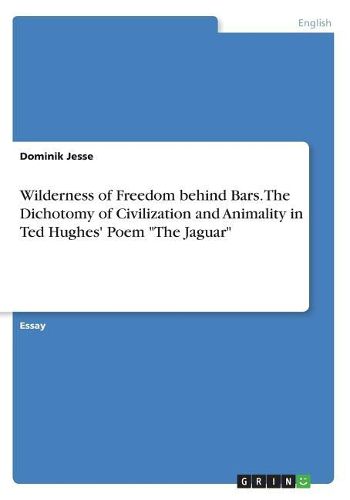Readings Newsletter
Become a Readings Member to make your shopping experience even easier.
Sign in or sign up for free!
You’re not far away from qualifying for FREE standard shipping within Australia
You’ve qualified for FREE standard shipping within Australia
The cart is loading…






Essay from the year 2017 in the subject English Language and Literature Studies - Literature, grade: 1,0, Free University of Berlin, language: English, abstract: While his fellow animals appear to have accepted their imprisoned reality in a zoo as being comfortable and safe, a jaguar rushes through his cage with restlessness and rage. It is not his restlessness and rage alone that mesmerize the human spectators who gather with awe in front of his cell. Rather it is the amazing contrast to the other animals’ behaviour that makes them turn towards the jaguars’ cage in a state of fascination. Something is bodily captured that is spiritually free. The difference between vitality and lethargy cannot be shown more drastically than in Ted Hughes’ The Jaguar, the second poem of his first anthology The Hawk in the Rain (1957). Indeed, Hughes was obsessed with the struggle between these two concepts, which he equated with life and death. Both vitality and lethargy manifest themselves, at the extreme, in the fundamentally different reactions of the animals to their confinement. Deeply connected with this contrast is Hughes’ criticism of modern western civilization, which he poetically formulates in his poem: by his sympathising with the enraged jaguar, he turns strictly against the apathetic cosiness of modern civilizations, the most blatant failure of which he identifies in the loss of humans’ animality. This animality, the magical closeness and return to the instincts and the primordial, inherent strength in human beings, is not only respected, but passionately emphasized by Hughes as a prerequisite for any vital humane existence. Modern societies that live in disregard for their animality and replace it completely with science and rationality lose their inner vital power and must eventually expire into lethal stagnation. That is why Ted Hughes depicts civilization and animality as diametrically excluding each other. The following analysis aims at elucidating the thesis
$9.00 standard shipping within Australia
FREE standard shipping within Australia for orders over $100.00
Express & International shipping calculated at checkout
Essay from the year 2017 in the subject English Language and Literature Studies - Literature, grade: 1,0, Free University of Berlin, language: English, abstract: While his fellow animals appear to have accepted their imprisoned reality in a zoo as being comfortable and safe, a jaguar rushes through his cage with restlessness and rage. It is not his restlessness and rage alone that mesmerize the human spectators who gather with awe in front of his cell. Rather it is the amazing contrast to the other animals’ behaviour that makes them turn towards the jaguars’ cage in a state of fascination. Something is bodily captured that is spiritually free. The difference between vitality and lethargy cannot be shown more drastically than in Ted Hughes’ The Jaguar, the second poem of his first anthology The Hawk in the Rain (1957). Indeed, Hughes was obsessed with the struggle between these two concepts, which he equated with life and death. Both vitality and lethargy manifest themselves, at the extreme, in the fundamentally different reactions of the animals to their confinement. Deeply connected with this contrast is Hughes’ criticism of modern western civilization, which he poetically formulates in his poem: by his sympathising with the enraged jaguar, he turns strictly against the apathetic cosiness of modern civilizations, the most blatant failure of which he identifies in the loss of humans’ animality. This animality, the magical closeness and return to the instincts and the primordial, inherent strength in human beings, is not only respected, but passionately emphasized by Hughes as a prerequisite for any vital humane existence. Modern societies that live in disregard for their animality and replace it completely with science and rationality lose their inner vital power and must eventually expire into lethal stagnation. That is why Ted Hughes depicts civilization and animality as diametrically excluding each other. The following analysis aims at elucidating the thesis